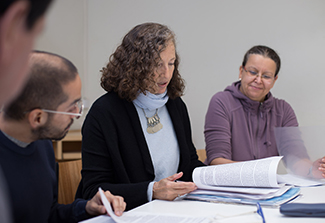A seat at the table: Diversifying voices in bioethics
July/August 2023 | Volume 22 Number 4
 Photo courtesy of Florencia LunaDr. Florencia Luna, principal investigator of the Training Program in Research Ethics in the Americas, meeting with trainees from Mexico and Colombia in Buenos Aires in 2019. “The influence that Fogarty has had in our region is enormous."
Photo courtesy of Florencia LunaDr. Florencia Luna, principal investigator of the Training Program in Research Ethics in the Americas, meeting with trainees from Mexico and Colombia in Buenos Aires in 2019. “The influence that Fogarty has had in our region is enormous."
While the field of bioethics was established in the 1960s, federal regulations for the ethics of research involving human subjects were not codified until 1972. Previously dominated by philosophers and theologians, the exponential growth of biomedical science in the 1970s led to the expansion of bioethics, previously dominated by philosophers and theologians, into a multidisciplinary endeavor involving anthropologists, policymakers, physicians, scientists, and the public.
Fast forward to 1997. U.S. trials had shown that the first HIV antiretroviral treatment, AZT, was effective in reducing perinatal HIV transmission (when a mother living with HIV passes the virus to her baby during pregnancy). A complex drug delivery regimen throughout pregnancy, delivery, and during the newborn’s first six weeks of life quickly became the standard in wealthy countries. A debate began about the implications of using this treatment in countries where the cost might be prohibitive, fewer births occurred in hospitals, and prenatal care began later in pregnancy, but LMIC voices were largely missing from the debate. This prompted Fogarty to develop a framework to help build bioethics training programs in LMICs and officially launch the International Bioethics Training Program program in 2000.
Fogarty’s Dr. Barbara Sina, who manages the program, “Our ultimate goal has always been to develop research ethics capacity and expertise so that countries can create their own ethical oversight processes and participate equally in the global dialogue on research ethics.”
Fogarty’s bioethics training grants were initially designed to help LMIC institutions develop master's level educational opportunities in ethics related to biomedical research involving human subjects. The researchers that helped develop these early programs aimed to address multiple issues such as: setting standards for acceptable use of placebos in clinical trials; mitigating undue influence on people to participate in trials, including when the alternative is no treatment at all; and communicating the potential risks to populations with little formal education and low literacy rates. Another early focus was building the capacity of local ethics review boards.
Dr. Nancy Kass is the Phoebe R. Berman Professor of Bioethics and Public Health at Johns Hopkins, where she is also both deputy director for public health at the Berman Institute of Bioethics and a professor of health policy and management at the Johns Hopkins Bloomberg School of Public Health. She is also among the first set of grantees who helped shape Fogarty's bioethics program. She says, “The impact of the programs Fogarty created, with minimal funding, is remarkable."
Over the last 23 years, the program has grown from an initial group of just five programs to a network of over 30 covering six continents and has expanded to offer doctoral and postdoctoral level training. Through these programs, hundreds of academics, scientists, and health officials have developed expertise to address the issues affecting their populations in their own contexts.
Dr. Florencia Luna, principal researcher at CONICET (National Scientific and Technological Research Council) in Argentina and principal investigator of the
Training Program in Research Ethics in the Americas at the University of Buenos Aires, was also one of the program's inaugural grantees. “The influence that Fogarty has had in our region is enormous," said Luna. “It's impressive to see the impact of training one person; that person goes on to train dozens more in the region."
Given the increasingly collaborative nature of research, and rapidly evolving technology in biomedical research, it's important to bring new voices with different perspectives to the global ethics conversation. “For the future of this program I hope to see more ownership of these trainings by professionals in LMICs infusing local values and priorities," says Kass. “It's already happening, which was always the goal, and Fogarty will remain critical for us as we continue to make that shift."
More Information
Updated August 17, 2023
To view Adobe PDF files,
download current, free accessible plug-ins from Adobe's website.
Related Fogarty Programs
Related Global Health Research Topics